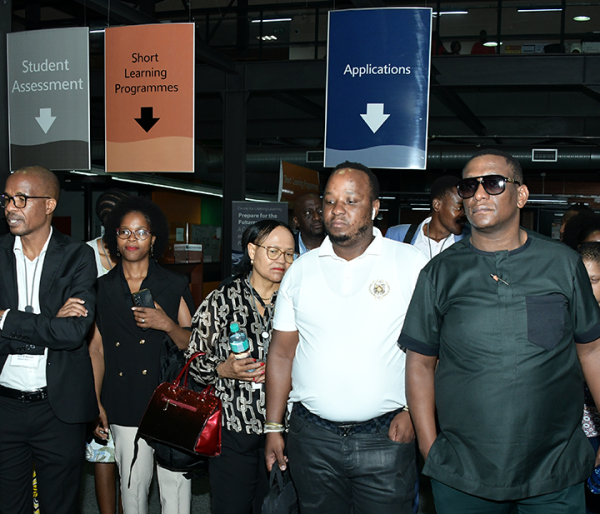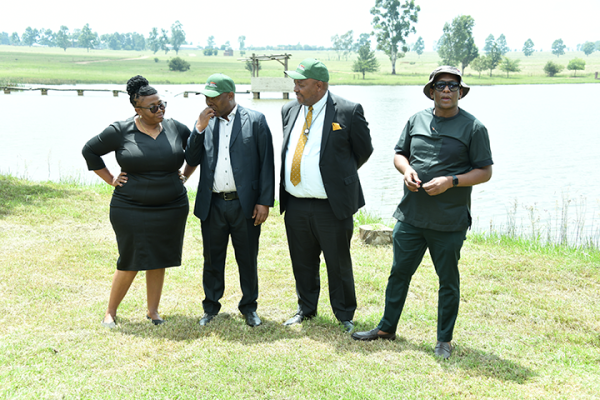News & Media
Parliamentary Portfolio Committee visits Unisa
On 27 February 2025, a delegation of the Parliamentary Portfolio Committee on Higher Education and Training led by its chairperson, Walter Tebogo Letsie, and including representatives from the National Student Financial Aid Scheme, recently conducted an oversight visit to various Unisa sites. The tour was aimed at, among others, assessing the university's efficacy in delivering affordable and high-quality education, and its state of readiness for the 2025 academic year. Student voices were also consulted.

Members of the Parliamentary Portfolio Committee on Higher Education and Training with Unisa Principal and Vice-Chancellor, Prof Puleng LenkaBula, and heads of the university’s portfolios
The mandate of the Parliamentary Portfolio Committee is to oversee and assess key areas linked to governance, legislation related to higher education, budget reviews, accountability measures put in place, registration processes and the university’s quality education offerings through its open distance and e-learning (ODeL) modality.
Unisa Principal and Vice-Chancellor (VC), Prof Puleng LenkaBula, together with various portfolio managers, Unisa Council members, ManCom, the National Student Representative Council and the university’s recognised unions, NEHAWU and Apsa, welcomed the committee members and led a tour of the university’s key departments. The tour included a visit to the registration section and the Unisa Centre of Excellence on Disabilities, the Sunnyside and Muckleneuk Campuses, and the university’s experimental farm.

One of the stops on the tour of Unisa’s facilities was the applications and registrations section at the Sunnyside Campus
The VC explained that the purpose of the visit was to provide the Portfolio Committee with a comprehensive update about the university’s state of readiness for the 2025 academic year, and to highlight key institutional developments, challenges and interventions to ensure the effective governance of Unisa and its academic excellence, student success, financial stability and infrastructure stability. She added: "This engagement serves to improve transparency, accountability, and collaboration between Unisa and the legislative oversight."
Bridging the gap between industry and the university
During a visit to the university’s experimental farm, Ntanganedzeni Mapholi, Executive Dean of the College of Agriculture and Environmental Sciences, detailed that the farm aims to drive training and research for the university’s students. She added: "Within the college we have about 15 000 students set to be trained at the farm as part of their practicals and work-integrated learning. In addition, the farm aims to develop entrepreneurship through establishing incubators and accelerators for student-led agricultural ventures."

Delegates visited Unisa’s experimental farm
Mapholi continued: "On the other hand, we envisage that the students will practise commercial farming and techniques, including research towards indigenous farming genetics in order to advise farmers on how to improve their practices."
Mapholi stated that on the cards at the farm are a laboratory aimed at biotechnology research, and research that can be translated into modern agricultural practices, and feed into consumer sciences’ curricula and other studies within the college. "In addition," she said, "the farm will include automated machinery and drones aimed at precision farming to improve efficiency." She said that all these efforts are aimed at improving the range of the university’s catalytic niche areas, whilst cultivating a new generation of skilled and passionate commercial farmers.
Concluding, Mapholi stated that the university aims to have a bigger impact on the community, and to meet the National Development Plan 2030 goals and Agenda 2063’s targets.
Given that the university accounts for more than a third of the country’s student population, the Portfolio Committee’s visit and engagement with the university’s management, students and student leadership highlighted the importance of collaborative efforts in ensuring the success and relevance of ODeL in a rapidly evolving digital landscape.
Core mandate
The Committee's focus on the said key areas ensures that Unisa delivers on its core mandate, that is, remaining a leading provider of inclusive and affordable high-quality education throughout the country, the continent, and the globe, and that the 2030 Strategy is actively reviewed and implemented.
The findings and recommendations arising from this session will contribute to the development of strategies towards enhancing the university's capacity to serve its key stakeholder, that is, its diverse student population.
The committee's engagement with the university’s leadership and student representatives highlighted the importance of collaborative efforts in ensuring the success of open distance and e-learning in South Africa.
* By Godfrey Madibane, Acting Journalist, Department of Institutional Advancement
** Photography by Shooheima Champion, Multimedia Centre
Publish date: 2025/03/03

 Unisa co-hosts G20 community outreach in the Eastern Cape
Unisa co-hosts G20 community outreach in the Eastern Cape
 Unisans gain membership of prestigious science academies
Unisans gain membership of prestigious science academies
 Advocating for disability transformation through servant leadership
Advocating for disability transformation through servant leadership
 Unisa Press continues to illuminate the publishing space
Unisa Press continues to illuminate the publishing space